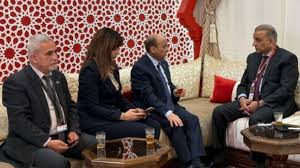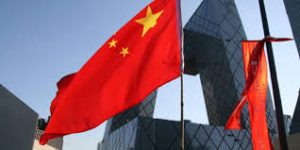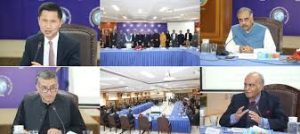US allies reject Trump administration’s move to reinstate sanctions against Iran
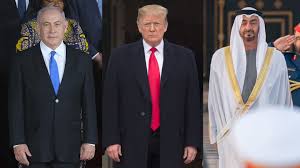
United Nations: The United States’ western allies on Thursday dismissed a Trump administration bid to reinstate international sanctions on Iran, opening a rift in the UN Security Council over the handling of Tehran’s nuclear programme.
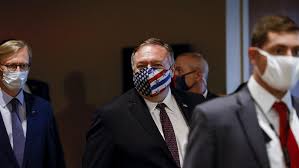
The United Kingdom, France and Germany said the US lacked standing to restore the measures, having withdrawn from the 2015 Iran nuclear deal to which those nations were party, along with China and Russia, and with which Iran remains largely in compliance.
US Secretary of State Mike Pompeo delivered the notification to the president of the UN Security Council, accusing Tehran of non-compliance, starting a 30-day clock that could lead to a “snapback” of UN sanctions.
All the remaining parties to the nuclear deal – Germany, France, Britain, Russia and China – immediately notified the Security Council, in letter that they did not recognize the US move.
“The US is not a participant of the JCPOA (the Joint Comprehensive Plan of Action), and has no right to trigger the so-called snapback mechanism and its arbitrary interpretation of resolution 2231 cannot change this reality,” Iranian Ambassador Majid Takht Ravanchi said. “We are of the firm conviction that the letter sent by the US today to the Security Council’s president and all the references therein is null and void and has no legal standing.”
China’s UN Ambassador Zhang Jun asked Indonesia, the 15-member council president of August, “not to identify and circulate the US communication as a notification” to trigger the snapback process and to consult with all council members on how to proceed.
Earlier on Thursday Russia’s UN Ambassador Vassily Nebenzia rejected the US plan as “nonexistent.” Russia called for the council to meet on Iran on Friday but it is understood that Washington blocked the request.
The United States acted after the Security Council resoundingly rejected its bid on August 14 to extend an arms embargo on Iran beyond its expiration in October.
“It is an enormous mistake not to extend this arms embargo. It’s nuts!” Pompeo told reporters at the United Nations as he harshly criticized what he described as the “one-sided, foolish” nuclear deal negotiated by former US President Barack Obama.
“The United States will never allow the world’s largest state sponsor of terrorism to freely buy and sell planes, tanks, missiles and other kinds of conventional weapons … (or) to have a nuclear weapon,” he said.
Pompeo said the US action will extend the arms embargo, which is set to expire Oct. 18, and also prohibit Iran from ballistic missile testing and enrichment of nuclear material.
Meanwhile, Russia’s Deputy Permanent Representative to the UN, Dmitry Polyansky, wrote on on Twitter: “Looks like there are 2 planets. A fictional dog-eat-dog one where US pretends it can do whatever it wants without ‘cajoling’ anyone, breach and leave deals but still benefit from them, and another one where the rest of the world lives and where international law and diplomacy reign.”
Two years ago, President Donald Trump withdrew from the 2015 nuclear deal between six global powers and Iran.
The US maintains that under the Security Council resolution endorsing the agreement it retains the right as an initial party to invoke the provision to “snap back” sanctions. Russia, China, Britain, France and virtually all other council members say the Trump administration does not have the right since it is no longer a party to JCPOA.
The US action sets the stage for a showdown that could lead to a crisis of credibility for the Security Council.
In a letter presented to Indonesia’s ambassador to the UN, Dian Triansyah Djani, who is the council’s president, Pompeo said the US was notifying the body of “significant non-performance” by Iran related to the nuclear deal. As a result, Pompeo said the process leading to the re-imposition of UN sanctions had been initiated.
The International Atomic Energy Agency has reported some Iranian violations of the agreement, but Tehran says those are the result of the US violating the accord by withdrawing from it and then re-imposing harsh unilateral sanctions.
Pompeo noted that the European participants in the deal had attempted to bring Iran back into compliance. But he said “despite extensive efforts and exhaustive diplomacy on the part of those member states, Iran’s significant non-performance persists.”
“As a result, the United States is left with no choice but to notify the council that Iran is in significant non-performance of its JCPOA commitments,” Pompeo wrote.
Pompeo’s letter was accompanied by a six-page explanation of why the US believes it retains the right to invoke snapback.
The US insistence that it can authorize snapback has already been rejected by virtually all other members of the 15-nation council. Germany, a participant in the Iran deal, is currently serving a two-year term on the council, and is also opposed.
“France, Germany and the United Kingdom note that the US ceased to be a participant to the JCPOA following their withdrawal from the deal on May 8, 2018,” the group said in a statement released after Pompeo presented the letter. “We cannot therefore support this action which is incompatible with our current efforts to support the JCPOA.”
Pompeo criticized the Europeans, accusing them of privately agreeing with the US concerns but lacking the courage to say so publicly. “Instead they chose to side with ayatollahs,” he said. “Their actions endanger the people of Iraq, of Yemen, of Lebanon, of Syria and indeed their own citizens as well.”
Iran’s Foreign Minister Mohammad Javad Zarif, meanwhile, told UN Secretary-General Antonio Guterres in a Thursday phone call that the Security Council must resist the US demand.
“This would have dangerous consequences for international law, it will bring nothing but the destruction of international mechanisms and it will discredit the Security Council,” Zarif said.
Under the terms of the Security Council resolution that enshrined the nuclear deal, Thursday’s notification starts a 30-day clock after which pre-2015 UN sanctions on Iran that were eased will be re-imposed unless a resolution specifically extending their suspension is passed. The US, however, would use its veto power to block any resolution extending relief from the sanctions.
Pompeo said a Security Council resolution will be introduced as required under snapback, but he wouldn’t say which country would initiate it.


